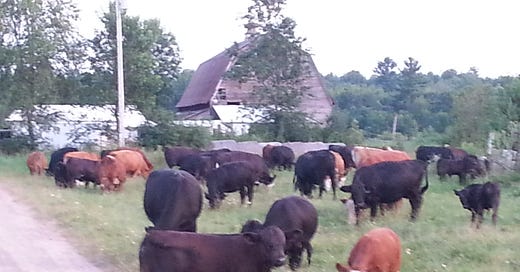While I like to think I'm an expert on global economics, I must confess that I actually don't know any more than the next guy. But I do want to share how any tariffs on imported beef affect our corner of the world.
Today, over 90% of all grassfed beef sold in the U.S. is imported. Yup, that Walmart "grassfed" beef almost certainly came from Argentina. While it almost certainly IS grassfed, it has spent at least a couple of weeks as a carcass in the hold of a ship. The way I understand it: They slaughter overseas, either put the uncut carcasses in refrigerated containers, or in the hold of a ship and they come to the US that way. Thanks to regulatory loopholes, it can still be labeled “Product of USA”. You read that right...Beef from overseas can wear the red, white, and blue label even if it never grazed an American pasture. If they cut it here, it becomes a product of the USA.
This is how the BIG meat companies undercut little domestic farmers like us.
Now, with new 10% tariffs on imported beef, these same meat companies (The Big 4: JBS, Tyson Foods, Cargill, and National Beef) are being forced to raise their prices as they scramble for domestic supplies. This also raises demand for true 100% USA-raised grass-fed beef like ours. Remember a tariff is actually paid for by the consumers in the country where the import is tariffed.
I am not sure if this is a win for us in the long run. It will stimulate domestic sales for certain. But in the short term, it is putting more pressure on domestic cattle markets as ranchers work to rebuild herds.
At the same time, China’s tariffs on U.S. grain could lower grain prices here, which encourages feedlots to buy more cattle, adding even more demand. When you factor in droughts out West, it’s no surprise that beef prices are climbing again this year.
And it's not just the tariffs on meat. The fencing supplies, tools, tires, building supplies, parts and other items that are needed to operate a farm are also on the tariff list and many come from China. As those operational costs go up, so do the prices just to keep the bills paid.
What does this mean for you and your hamburger?
We source all our meat within a 50 mile radius from local farms that have similar protocols to ours. We also have to buy at competitive market rates so the farmers don't go to the local sale barn but instead of sell to us. If the market rate climbs as the big wheels push the prices up we have to follow suit just to keep our inventory up. It is also not helping that a year's worth of inventory went up in smoke last November.
As we slowly get our stocks back up, the availability of animals is a huge factor. We have to balance the pricing and guess what the market will do, as well as attempt to keep the rates tolerable for our customers.
It is possible the beef tariffs will improve US domestic beef sales and in the long run make it possible for US beef farmers to survive. But if the rest of the economy collapses, which is another concern, then people will not necessarily be turning to meat for their protein source.
While we’re doing ok now, we’re not immune to the broader trends in the cattle market.
So… Starting in June, you can expect to see some price adjustments in our online store as we work to keep pace with the rising costs of livestock and ensure we continue to fairly support our farm partners and secure our supply.
As always, we’re committed to being upfront and transparent with you about why prices change. We will always try to make sure you hear it from us first with plenty of lead time to help you navigate large scale price adjustments.
No worries.
SV




Thanks for these details, very interesting.